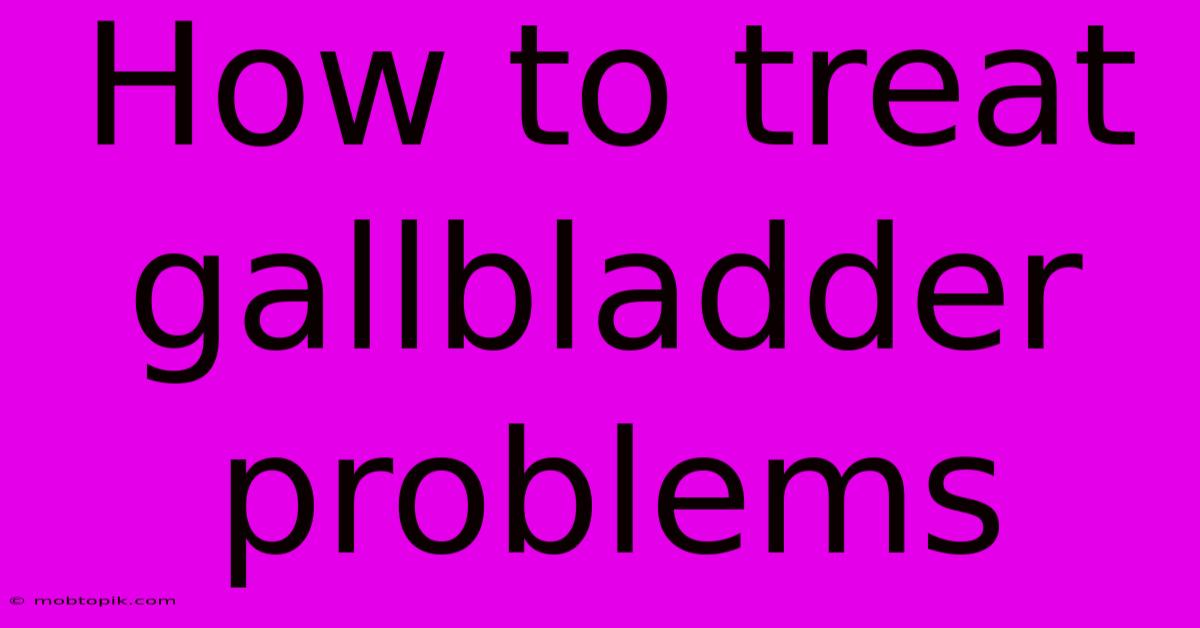How To Treat Gallbladder Problems

Discover more detailed and exciting information on our website. Click the link below to start your adventure: Visit Best Website mobtopik.com. Don't miss out!
Table of Contents
How to Treat Gallbladder Problems: A Comprehensive Guide
The gallbladder, a small pear-shaped organ nestled beneath your liver, plays a crucial role in digestion. It stores bile, a fluid produced by the liver that helps break down fats. When the gallbladder malfunctions, it can lead to a range of problems, from mild discomfort to severe pain requiring immediate medical attention. This comprehensive guide explores various gallbladder issues, their treatment options, and lifestyle changes that can promote gallbladder health.
Understanding Gallbladder Problems
Several conditions can affect the gallbladder, the most common being:
1. Gallstones:
Gallstones are hardened deposits that form within the gallbladder. These stones, which can vary in size and number, are primarily composed of cholesterol. Smaller gallstones may cause no symptoms, while larger ones can obstruct the cystic duct (the tube connecting the gallbladder to the common bile duct), leading to intense pain, known as a biliary colic. Symptoms of gallstones can include:
- Severe abdominal pain: Often felt in the upper right abdomen, which may radiate to the back or right shoulder.
- Nausea and vomiting: Frequently accompanying the pain.
- Fever and chills: Indicating a potential infection.
- Jaundice: Yellowing of the skin and whites of the eyes, a sign of bile duct blockage.
Treatment for gallstones often involves surgical removal of the gallbladder (cholecystectomy). This procedure is typically performed laparoscopically, a minimally invasive approach with a shorter recovery time. In some cases, medication may be used to dissolve gallstones, although this is less common and successful only for certain types of stones.
2. Gallbladder Inflammation (Cholecystitis):
Cholecystitis is inflammation of the gallbladder, frequently caused by gallstones obstructing the cystic duct. The trapped bile can cause infection and swelling. Symptoms are similar to gallstones but often more severe and include:
- Persistent, intense pain: More severe and prolonged than biliary colic.
- Fever and chills: More pronounced due to the infection.
- Tenderness to the touch: In the upper right abdomen.
Treatment for cholecystitis typically involves intravenous fluids, antibiotics to combat infection, and pain medication. A cholecystectomy is usually recommended once the acute inflammation subsides.
3. Gallbladder Cancer:
Gallbladder cancer is a relatively rare but serious malignancy. Risk factors include gallstones, chronic cholecystitis, and certain genetic conditions. Symptoms are often vague in the early stages, making early detection challenging. As the cancer progresses, symptoms may include:
- Persistent abdominal pain: Often dull and aching.
- Weight loss: Unexplained and significant.
- Jaundice: Yellowing of the skin and eyes.
- Nausea and vomiting: Persistent and unrelated to meals.
Treatment for gallbladder cancer depends on the stage of the cancer and may include surgery, chemotherapy, radiation therapy, or a combination of these approaches. Early detection significantly improves the chances of successful treatment.
Treatment Options: A Deeper Dive
The primary treatment for many gallbladder problems is a cholecystectomy. This procedure, often performed laparoscopically, involves removing the gallbladder through small incisions. Recovery time is relatively short, and most individuals return to their normal activities within a few weeks.
Non-surgical treatments are occasionally considered, particularly for gallstones in individuals who are poor surgical candidates. These may include:
- Medication: Certain medications can dissolve cholesterol gallstones, but this approach is not always effective and requires careful monitoring.
- Extracorporeal shock wave lithotripsy (ESWL): This procedure uses shock waves to break up gallstones, but it is not always successful and may not be suitable for all individuals.
Lifestyle Changes to Support Gallbladder Health
While medical intervention is sometimes necessary, several lifestyle changes can support gallbladder health and reduce the risk of developing problems:
1. Maintain a Healthy Weight:
Obesity is a significant risk factor for gallstones. Losing weight gradually through a balanced diet and regular exercise can help reduce your risk.
2. Eat a Balanced Diet:
A diet rich in fruits, vegetables, and whole grains can promote overall health and may reduce the risk of gallstones. Limit your intake of saturated and trans fats, as these can contribute to cholesterol gallstone formation.
3. Stay Hydrated:
Drinking plenty of water helps flush out toxins from the body, potentially reducing the risk of gallstone formation.
4. Manage Stress:
Stress can affect digestive health. Practice stress-reducing techniques such as yoga, meditation, or deep breathing exercises.
5. Regular Exercise:
Regular physical activity is essential for maintaining a healthy weight and improving overall health, which can reduce the risk of gallbladder problems.
When to Seek Medical Attention
Seek immediate medical attention if you experience:
- Sudden, severe abdominal pain: This could indicate a gallbladder attack or other serious condition.
- Fever and chills: These are signs of a potential infection.
- Jaundice: Yellowing of the skin and whites of the eyes.
- Nausea and vomiting: Persistent and severe nausea and vomiting.
Early diagnosis and treatment are crucial for managing gallbladder problems effectively. Don't hesitate to consult a healthcare professional if you have any concerns about your gallbladder health. They can perform a physical exam, review your medical history, and order necessary tests, such as ultrasound or blood tests, to determine the appropriate diagnosis and treatment plan. Remember, proactive management of your health and lifestyle can significantly reduce your risk of developing gallbladder issues.

Thank you for visiting our website wich cover about How To Treat Gallbladder Problems. We hope the information provided has been useful to you. Feel free to contact us if you have any questions or need further assistance. See you next time and dont miss to bookmark.
Also read the following articles
| Article Title | Date |
|---|---|
| How To Treat Ulcers | Nov 29, 2024 |
| How To Treat Obesity | Nov 29, 2024 |
| Avrupa Ligi Rangers 4 1 Nice Oezeti | Nov 29, 2024 |
| How To Treat Constipation | Nov 29, 2024 |
| How To Treat Pneumonia | Nov 29, 2024 |
